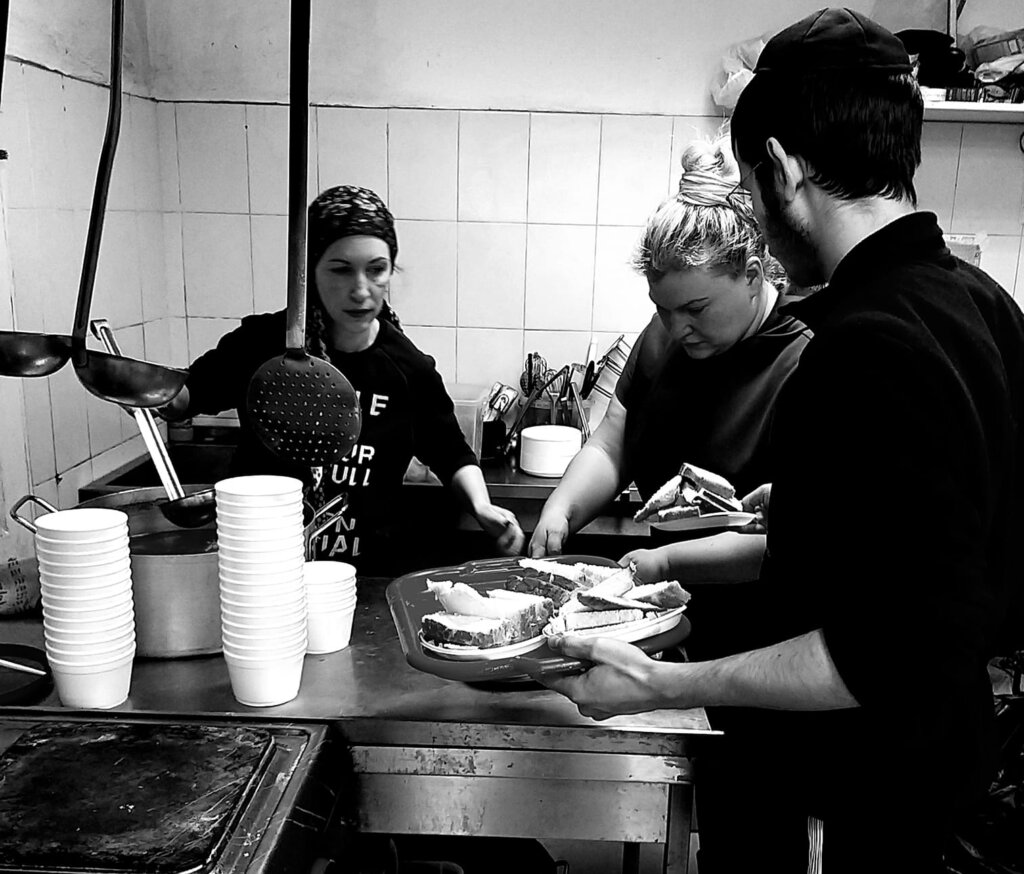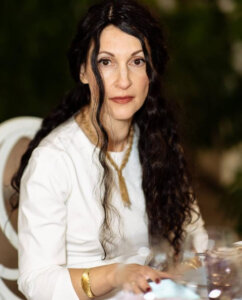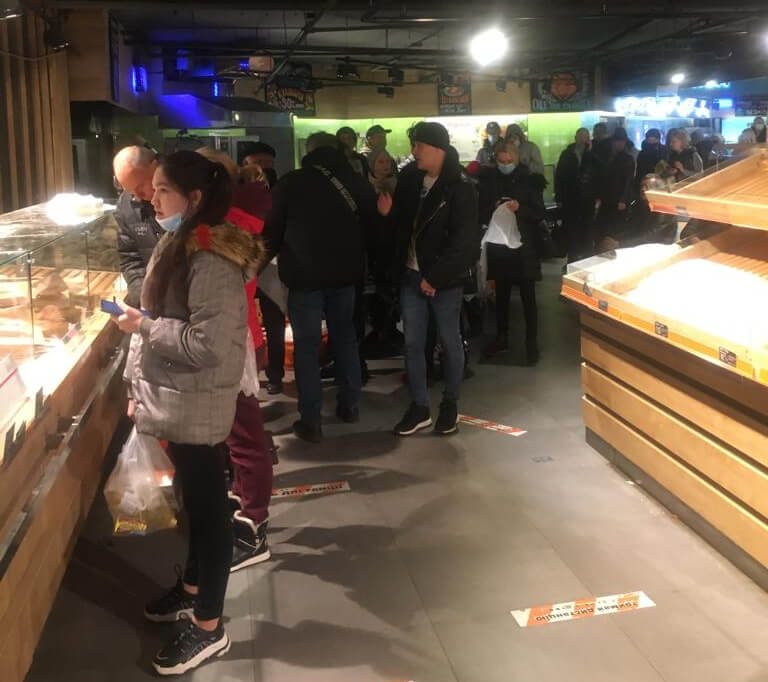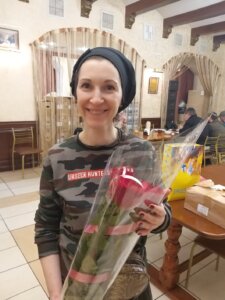She could leave Ukraine, but stays to preserve its Jewish future
Rachel Strugatsky was a surgical nurse in Jerusalem. Now she tends to the wounded at her Kyiv synagogue

Graphic by Angelie Zaslavsky
Rachel Strugatsky made aliyah as a teenager but was pulled back to her native Ukraine — twice. Now 46, and with Russian shells falling uncomfortably close to her home in Kyiv, she could leave for Israel again— this time with her three children.
But she won’t. Hers, she said, is the only family in her congregation — the Brodsky Synagogue — that remains in the city.
“I ask myself, ‘Why am I here?’” she said. “And my answer is: ‘So that Kyiv Jews who escaped have a reason and the place to return to.’”
Raised in Soviet Ukraine with little exposure to Judaism, Strugatsky grew religious in Israel, where she worked as a surgical nurse at Jerusalem’s Hadassah Ein Kerem hospital. Back in Ukraine, she married an observant man and switched careers, finding more satisfaction as a teacher in a Jewish day school.

Since the Russian invasion of Ukraine in February, Strugatsky has spent her days — and many nights — in Kyiv’s central synagogue, where she is a nurse again, heading up its efforts to treat casualties of war. She tends to the wounds of both civilians and soldiers, makes sure the elderly get their blood pressure medication and feeds anyone who shows up hungry — Jews and non-Jews alike.
She has stepped up to serve, she said, because her skills are needed, and because her experience as an outsider in her native country and an immigrant in Israel compel her to help anyone unmoored by circumstances beyond their control. The path she beat between Israel and Ukraine led her to where she needs to be right now, she said.
The Russian army has flattened much of Eastern Ukraine, where Strugatsky was raised. But from the relative safety of the capital, she still takes account of tremendous loss — and what she said will never be lost.
“We were ‘liberated’ from everything that we loved, that we cherished, from the possibility of seeing relatives, from not being able to even visit the graves of loved ones,” she said of the Russian onslaught. “But what matters the most is what they didn’t ‘liberate’ us from — our faith.”
To Israel and back again, and again
Strugatsky grew up in Soviet-era Ukraine, when antisemitism was rampant and Judaism hard to practice. Somehow, she said, the family found matzo for Passover. Her grandparents spoke Yiddish to each other when they didn’t want her to know what they were talking about.
They made aliyah in 1991, settling in Nahariya when she was a teenager. But her parents never grew strong roots in Israel as she did, and after a few years packed the family up and moved them back to Ukraine. Strugatsky finished high school in the Eastern Ukrainian city of Chernihiv, and graduated from its medical college with a nursing degree. Missing Israel, at 21 she made aliyah again, this time by herself, and began her nursing career in Jerusalem.

She befriended her neighbors, religious Jews who introduced her to rituals and holidays. Observing Yom Kippur for the first time, she was moved to immerse herself in Judaism.
But only three years later, her mother fell ill, and Strugatsky returned to Ukraine. “I was happy in Israel and saw my future there. But I was brought up to think about others first, family foremost,” she said. “So, I didn’t hesitate to leave my promising prospects in Israel when my mother needed care”
She took a job as a nurse at a newly opened Chabad school in Chernihiv, where staff saw that her proficiency in Hebrew was as useful as her medical skills, so she also began to teach. She married Nathan Strugatsky, who was from Kyiv, where the couple moved after her mother died.
The war
Like many Ukrainians on Feb. 24, Strugatsky was shocked when Russian tanks crossed into Ukraine. “Despite all the threats and warnings I never thought it would come to real war,” she said. “In the 21st century? With casualties and atrocities committed by Russian soldiers?”

Everything changed for her family. Her husband, Nathan Strugatsky, watched his real estate business founder, because under martial law, no property may be bought or sold. And her work at a Jewish school — there are two in Kyiv, one for boys and another for girls — also ended.
She had loved teaching about Jewish traditions, and assisting other teachers who needed to translate Torah from the Hebrew. But many of her students moved away weeks ago, and enrolled in schools in safer parts of Ukraine or elsewhere in Europe. And though public schools in Kyiv reopened in April, only a few have held any classes and few children show up.
With no income, Strugatsky worried how she would feed her children: a daughter, 20, and two sons, 16 and 6. Even if they had money, grocery store shelves are often bare, and the lines to shop are hundreds of people long.
Life in Kyiv now, Strugatsky said, is “a set of mechanical actions to support the physical side of existence.”
Enlisting
The war was not a week old when Strugatsky signed up for Territorial Defense Forces, which organizes volunteers in Ukrainian cities. Strugatsky’s nursing skills were needed at the front, and she wanted to help her homeland. But as she began packing, her children balked, fearful that she would be hurt or killed. So she asked to be reassigned to Kyiv’s central hospital.
Waiting to be called to serve, she visited the Brodsky Synagogue, where her family attends services. In these first days of the conflict, she hadn’t expected it to be open. But it was, and its rabbi, Reuven Azman, had already begun caring for refugees as they made their way to the capital from battered cities and towns to the east. Already 300 people had arrived from Chernihiv, where she is from. Many were physically wounded, and shaken by the violence they had seen.
It was then she knew, she said, what she was meant to do in this war. The hospital had other nurses, but the synagogue had none, and was filling up with people who needed her help. They arrived by the busload. Strugatsky had never been to the battlefield, but the battlefield, it seemed, had come to her.
She did triage, figuring out who needed to be placed in an ambulance immediately and sent to the hospital. They included several people with blood pressure so high she feared they might have a heart attack. She treated injuries from shrapnel and blunt force, and administered pills and injections as supplies allowed.

Strugatsky is now at the synagogue every day, nursing refugees whom Azman, drawing on a network of donors, continues to invite into the sanctuary. She has come to oversee not only healthcare at the synagogue, but its programs to feed hungry Ukrainians. Her husband helps by organizing supplies and delivering food.
On Shabbat, Strugatsky cooks in the synagogue’s kitchen for her own family and people she never met. Around Purim she convinced a bakery, which closed after the war began, to open temporarily so she could bake mounds of hamantaschen. She stayed up all night making the holiday cookies, and added them to care packages for the elderly, who sent her bouquets of flowers in thanks.
‘Ukraine’s bright future’
Strugatsky, who emigrated to Israel both as a child and as an adult, now sees herself remaining in Ukraine. She doesn’t want to be a refugee, and leaving her native country, despite her Israeli citizenship, would make her one, she said.
War has made her miss small and big things. She mentions a trip to the hair salon, and the opportunity to plan for the future.
But the most painful loss, she said, was the removal of the Torah scrolls from the Brodsky Synagogue. For three weeks after the war began, they were gone. Azman had taken them to what he thought would be a safer location. They are back now, but during that time, she said she feared the eradication of Jewish life in Ukraine.
She stays, she said, to be one of those people who will ensure it will endure, and refers to a phrase Ukrainians began saying at the inception of the war to reassure one another. It translates to “everything will be Ukraine.”
“I wholeheartedly believe in Ukraine’s bright future,” she said.




















